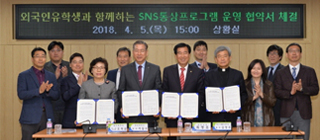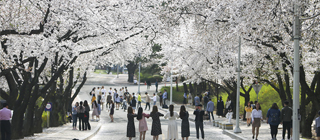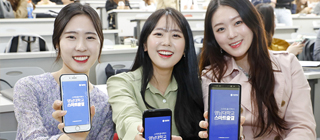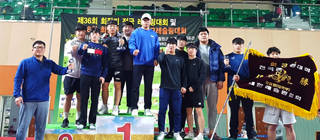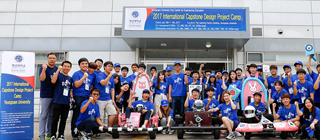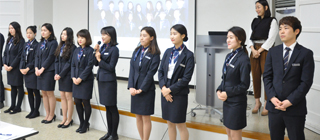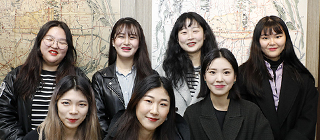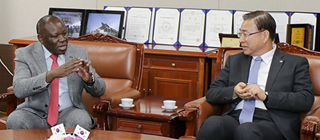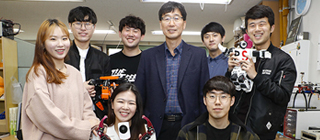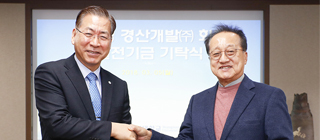-
MOU signed between 3 universities in the region (YU, Daegu Catholic University and Daegu University and Gyeongsan City Operating SNS commerce program with international students Engage in various activities such as going to overseas business trips, interpretation and translation, SNS experience posts, etc. from May [April 6, 2018] YU (President Sur Gil-soo) will work with other local universities to help local universities in export operations. YU signed an MOU for ‘SNS commerce program with international students’ to utilize the international student pool together with Daegu Catholic University, Daegu University and Gyeongsan City at the Gyeongsan City Hall Situation Room on the 5th. The ‘SNS commerce program with international students’ is a 1:1 matching project for companies and international students based on data collected through surveys. With this MOU, the institutes agreed to ▲create an environment for export operations support by excellent international students ▲co-hosting education and training programs ▲promoting products of local companies through SNS, etc. The three universities including YU and Gyeongsan City will recruit and select international students and provide training programs related to international trade and begin various activities with companies from May such as joining overseas business trips, interpretation and translation, and SNS experience posting through 1:1 matching. YU President Sur Gil-soo said, “This MOU will be an opportunity for international students to also play a role in local development as members of the community,” and added, “I hope that this will be a win-win program for international students to gain practical experience and companies to enhance their competences for growth with the community.”
-
-
-
First place overall by winning 2 golds, 3 silvers and 3 bronze medals Park Cheol-woong wins MVP and Kim Ik-hee wins best coach awards Won overall first place at the 28th Fall Wrestling Tournament becoming the top collegiate wrestling team [March 21, 2018] The YU wrestling team (Coach Kim Ik-hee) won overall first place at the 36th National Wrestling Championship The YU wrestling team won a total of eight medals including two golds, three silvers and three bronze medals in the collegiate section of the championship at the Cheorwon Gymnasium in Gangwon-do from the 15th to the 18th to place first overall. At this tournament, Park Cheol-woong (21, College of Special Physical Education senior, 97kg) and Kim Yong-hak (20, College of Special Physical Education junior, 74kg) won gold medals, Kim Jong-won (20, Sports Science senior, 86kg), Park Chang-hwan (19, College of Special Physical Education sophomore, 92kg) and Gong Ji-min (18, Sports Science freshman, 61kg) won silver medals, and Kim Sung-soo (20, College of Special Physical Education senior, 125kg) Ahn Jae-yong (20, Sports Science junior, 57kg) and Han Hyun-soo (19, College of Special Physical Education sophomore, 125kg) won bronze medals. Park Cheol-woong, who won the gold medal in the 97kg and under division, received the MVP, while YU Wrestling Team Coach Kim Ik-hee won the Best Coach Award for his efforts to win overall first place. The YU Wrestling Team also swept a total of eight medals such as four golds, one silver and three bronze at the 28th National Fall Wrestling Tournament to take overall first place. At the most recent championships, it maintained its position as the best collegiate wrestling team. Coach Kim Ik-hee who brought the glory days of the YU wrestling team said, “I would like to thank the athletes who persevered and trusted me despite the harsh schedule of matches and training.” He added, “We will continue to do our best in training to achieve even more than we already have.”
-
Ministry of Trade, Industry and Energy’s ‘Support project for fostering creative convergence engineering human resources’ To foster engineers with national funding of a total of 1.2 billion won for four years until February 2022 Foster engineers who will lead the 4th industrial revolution in ICT, smart vehicles and IoT convergence [March 29, 2018] <‘2017 International Capstone Design Project Camp’ hosted by the YU Engineering Education Innovation Center> YU (President Sur Gil-soo) was selected for the ‘Engineering Education Innovation Center’ (formerly Engineering Education Innovation Hub Center’ for the Ministry of Trade, Industry and Energy’s support project for fostering creative convergence engineering human resources’. By being selected for this project, YU will receive a total of 1.2 billion won in national funding for four years – 300 million won per year – from this year until February 2022 to focus on fostering engineers. A total of six universities were selected such as YU, Korea University, Pusan National University, Seoul National Institute of Science and Technology, Sungkyunkwan University and Chonbuk National University. YU has been pursuing the Engineering Education Innovation Center project that began in 2012 for the sixth year, and with this selection, it will pursue this project for a total of 10 straight years. <YU took the grand prize in the University of the Year Award held at the ‘2016 Engineering Education Festival’> YU Engineering Education Innovation Center Director Song Dong-joo (Professor of Mechanical Engineering) explained, “A systematic engineer fostering system is needed to improve innovative and creative problem-solving skills in order to empower engineering students, and our center will be in charge of this.” He added, “YU is planning to foster engineering students who will lead the 4th industrial revolution by developing and operating educational programs according to the needs of the core industries of the future.” The YU Engineering Education Innovation Center is planning to operate educational courses and industry-academic cooperation education specialized for the new industries of the future such as ICT (information communication technology), smart cars and IoT (Internet of Things) convergence, while pursuing holding various contests, international Capstone design project camps, engineering festivals, etc. to meet the demands of businesses. Meanwhile, the MOTIE is pursuing the ‘creative convergence engineer fostering support project’ to foster creative engineers to meet the demands of industries and improve the global competitiveness of engineering education. As part of this, the Engineering Education Innovation Center project is joined by universities in different regions centering on the regional hub university. A total of 18 universities (as of Feb 2018) in the Gangwon, Chungcheong, and Gyeongsang regions will participate in the YU Engineering Education Innovation Center, which is the highest number of colleges in the nation, and it is playing a centrifugal role for domestic engineering education.
-
-
YU Art Conservation major students draw attention by restoring two artifacts in the university museum Only 20 students in the entire class with professional skills participating in restoration work of collections of the National Museum Must complete 5 different majors. Difficult but promising as a professional field [March 13, 2018] <YU Major of Art Conservation students> (top row from left to right: Lee Ok-seon, Kim Hye-bein, Kim Young-won, Park Shi-eun, bottom row from left to right: Lee Hye-mi, Lim Ji-soo, Lee Yun-ah) Our proud cultural heritages were reborn at the hands of YU students. YU Major of Art Conservation interdisciplinary students (supervised by School of Fine Arts, Advisor Lim Nam-soo) restored two artifacts at the YU Museum. The pieces are ‘Doseongdo’ (early 19th century), which is a painted map of Seoul in the late 18th century, and a eight-screen folding door painting comprised of stationery paintings. This exhibit is the result of the ‘Painting Preservation and Restoration Training Class (Professor Jung Doo-hee)’, which is a major class for the second semester of last year. The restored work was put on display on the 1st floor lobby of the Central Library from March 5 to March 9, drawing the attention of students. <Original (left) and restored work (right) of the ‘Doseongdo (YU Museum Collection, early 19th century) restored by Art Conservation majors> YU School of Fine Arts senior Park Shi-eun (21, interdisciplinary study major in art conservation), who participated in the restoration project, said, “A lot of work and time is needed to make a restored version as it is necessary to conduct research on the original and completely reproduce even the smallest details.” She added, “We carefully restored the damaged parts of the cultural artifact and configured the colors exactly like the original with natural pigments. In particular, as several people worked together taking on different roles and later combine the piece, teamwork was crucial.” The YU Major of Art Conservation is a small group of elite students. There are only 20 persons in the entire grade, but their skills are on par with professionals. They also participated in various restoration projects at national museums. They have been recognized for their skills and even participated in the restoration of project of a portrait of King Gojong (collection of the National Museum of Korea) at the request of the National Palace Museum of Korea. They also participated in the restoration of a 4 meter long farm flag at the National Maritime Museum in Busan, and the work that they restored was used at the Haeshinje Festival. <Production process of the restored version of the 'Doseongdo' (YU Museum)> School of Fine Arts Professor Lim Nam-soo who is the head professor of the major said, “Experience with restoring paintings and historical artifacts of various genres is very important. It is possible to vastly improve skills by looking at valuable cultural artifacts possessed by the National Museum and the university and have the opportunity restore them.” He added, “Most students majoring in art conservation work by looking at books or digital files. YU students, however, have the educational infrastructure in which they can see the actual piece to work on them, which will help improve their skills significantly.” YU School of Fine Arts senior Kim Hye-bin (22, interdisciplinary major in Art Conservation) said, “I was able to see the original several times while working on it. Originals and photos have considerable differences, so it is only obvious that there will be differences in the restored work. Being able to see the actual piece was really helpful.” <Stationery painting restored by students majoring in art conservation> The major of art conservation is an interdisciplinary course combining the five majors of the School of Fine Art’s major of painting and major of transart, as well as the School of Materials Science and Engineering, Department of Fiber System Engineering, and the Department of Forest Resources and Landscape Architecture. This program was newly established in 2016 and there are currently 20 students in the interdisciplinary major course. These students will prepare to acquire cultural artifact repair technician copying technician. After graduating, career options include becoming a preservation and restoration expert at museums and art galleries. YU School of Fine Arts senior Kim Young-won (21, interdisciplinary major of art conservation) said, “It is important to base the foundation on examining the original and working on site. It is not just copying an original piece, but instead, preparations such as understanding the artist’s style and collecting data on the work are crucial. Furthermore, the genres of cultural artifacts and art pieces are very diverse. It is also important to identify the properties of the materials for the preservation and restoration of various artworks and craftwork such as architecture, sculpturing, crafts and painting. It is difficult and that is why knowledge on various majors is needed.” Professor Lim said, “Paintings usually is on making creative pieces. Art conservation deals with various fields starting from creation to follow-up such as conservation and restoration and thus requires integrated knowledge on various majors, therefore giving it bright prospects as a professional field.” Professor Jung Doo-hee, who is in charge of the painting preservation and conservation class, said, “The YU Museum possesses many cultural artifact-level relics such as ancient maps. I suggested to the museum that it would be meaningful to do restoration work on the artifacts possessed by the university and that it would help students, and the museum agreed happily.” He added, “We will continue the restoration projects on our artifacts with students in our major by working with the library and museum in the future.”
-
International student of Park Chung Hee School of Policy and Saemaul international returned to Tanzania after graduating and became a governor Recently visited YU and Gyeongsan City with businessmen asking to help develop Tanzania Pursuing positive exchange in various fields including government, academic and industries [March 7, 2018] A Tanzanian graduate of the YU Park Chung Hee School of Policy and Saemaul became mayor back at his home country and returned to YU. Matthew N. Lubongeja (53) of the Sengemara District, Tanzania, came to learn the know-how of YU using Korea’s economic development experience as the role model for its development. On February 27, Mayor Lubongeja visited YU together with Tanzanian businessmen including Jonta Investment Limited Chairman John Elias Ntalimbo and met with YU President Sur Gil-soo requesting YU’s assistance for the development of Tanzania. Mayor Lubongeja enrolled at the YU Park Chung Hee School of Policy and Saemaul in September 2016 and earned his master’s degree in February 2018. Mayor Lubongeja was the vice-mayor at the time he enrolled at the graduate school. Mayor Lubongeja said, “The experience that I gained at the YU Park Chung Hee School of Policy and Saemaul played a decisive role for me to become mayor.” He added, “I was deeply impressed with Korea’s development based on the Saemaul Undong that I learned at YU. The first thing that I thought about after becoming mayor was to integrated Korea’s economic development policies and know-how into Tanzania to make my country economically strong just like Korea. I have come to YU with Tanzanian businesspeople to learn about this know-how.” YU President Sur Gil-soo said, “The Saemaul Undong and spirit acted as the driving force for Korea’s rapid development. YU established an academic system in various fields such as international development based on the Saemaul science.” He added, “The academic knowledge and know-how accumulated by YU will help the development of not only Tanzania, but other developing countries around the world as well.” While meeting with Mr. Sur, Mayor Lubongeja proposed exchange cooperation with Tanzanian universities such as the Sokoine University of Agriculture and St. Augustine University of Tanzania. In response to Mayor Lubongeja’s proposals, YU is planning to pursue international cooperation projects such as jointly carrying out education to transmit the Saemaul Undong and Saemaul spirit as well as regional development projects. Businessmen from Tanzania that visited YU together with Mayor Lubongeja showed deep interest in YU’s educational mission and the academic program of the Park Chung Hee School of Policy and Saemaul, and said in unison, “If youths from Tanzania come study at YU to gain knowledge and experience, it will help greatly with the development of Tanzania.” Mayor Lubongeja not only visited YU, but also Gyeongsan City, where YU is located, to discuss making friendly relations with Gyeongsan Mayor Choi Young-jo. Mayor Lubongeja revealed that he would like to pursue exchange focusing on the advanced agricultural technologies of Gyeongsan and dispatch a public official of Sengemara to Gyeongsan to learn the advanced agricultural technologies. Mayor Lubongeja’s visit to YU and Gyeongsan received huge attention from the Tanzanian press as well (left on photo, press coverage in Tanzania, link:https://globalpublishers.co.tz/kampuni-za-tanzania-korea-zasaini-ushirikiano-katika-ujenzi). This is because he believes that exchange with YU will help with the development of Tanzania. As an international student of the YU Park Chung Hee School of Policy and Saemaul became a governor at his home country and is actively pursuing exchange with various Korean institutes together with Tanzanian public officials, scholars and entrepreneurs, it is expected that the social and economic ripple effect will be considerable for both countries.
-
8 institutes including YU participated with support from MSIT for R&D for 2 years starting last year 9 people including Department of Electric Engineering (and Robotics and Intelligent Machine Engineering) Professor Lee Seok-gyu and graduate and undergraduate students participated Developed the curling robot ‘delivery motion and communication’ technology development that requires high technologies [March 16, 2018] <YU Professor Lee Seok-gyu’s research team that participated in producing the world’s first curling robot> The ‘AI Curling Robot Demonstration’ hosted by the Ministry of Science and ICT at the Korean Paralympic Committee Icheon Training Curling Center (Icheon, Gyeonggi-do) on the 8th drew huge attention. This is because of the popularity of ‘Team Kim’ that won the silver medal at the Pyeongchang Winter Olympics while yelling, ‘Young-mi, Young-mi’, which carried on to the curling match between humans and the world’s first curling robot that includes various advanced technologies including AI, which is the core technology of the 4th industrial revolution. A YU research team was in charge of the ‘curling robot delivery motion control and communication technologies’, which is one of the core technologies of the curling robot ‘Curly (photo on right)’. Development of ‘Curly’, which was funded by the MSIT, was joined by over 60 researchers from eight institutes including Korea University, YU and NT Robot. The research period spans from April 2017 until the end of this year. ‘Curly’ that was developed in the first year includes the delivery robot and skip robot, and this year, which is the second year, developments are being made on the sweeper robot. The YU research team that participated in this research include Department of Electrical Engineering (and Robotics and Intelligent Machine Engineering) Professor Lee Seok-kyu, Bae Hyun-soo (28) and Yoo Hee-rak (28) in the combined master’s degree program of the Graduate School of Electrical Engineering, Kwon Jae-hyun (24) in the master’s degree program, Kim Yun (23) senior at the undergraduate Department of Computer Engineering, and Department of Electronic Engineering senior Lee Chan-gyu (23), junior Jung Hyun-woo (26), Lee Joo-hyung (20), and Kim Nan-hee (20). They are all members of the YU robot club ‘Power Supply’. Students with various majors exchange knowledge and information at ‘Power Supply’ and enhanced their research capacities in the robot production sector through convergence of different majors. The curling robot identifies the match situation through the camera mounted on the head and learns delivery strategies based on deep-learning to carry out the match on the ice. When the ‘skip robot’ transmits the match video perceived through its camera, the optimal delivery strategy is computed. The ‘delivery robot’ on the other side of the rink controls the force, direction and stone curl rotations necessary to send the stone to the target. The technology to control the delivery motion of the curling robot and the communication technology for exchanging robots between the robots and with the robot server were developed by the YU research team. As curling is played on top of ice, it has high uncertainties, and therefore, the delivery motion control of the curling robot requires highly advanced technologies. Furthermore, procuring stable high-speed communication technology is another core technology for real-time curling matches of the robot. Department of Electrical Engineering (and Robotics and Intelligent Machine Engineering) Professor Lee Seok-kyu said, “It is expected that the communication technology and the technology that adjusts the stone speed and rotations according to strategies considering the uncertainties of the continuously changing ice on the curling rink will be applied in other sectors in the future as well.”
-
Promised to donate a total of 100 million won for 5 years in the premium humanities lecture <Humanities at 20> “It is crucial for young people to learn about humanities” Agreed on expanding industry-academic cooperation projects in music, arts and sports between YU and Daegu CC [March 5, 2018] <?xml:namespace prefix = "o" /> Daegu Country Club (CC) Chairman Woo Gi-jeong (72, right on photo) decided to provide full support for the YU humanities lecture. Mr. Woo donated 100 million won for operating expenses of YU’s premium humanities lectures ‘Humanities at 20’ (Professor in charge, Choi Jae-mok). Mr. Woo will donate 20 million won every year for five years starting this year to donate a total of 100 million won to YU. Mr. Woo said, “I think it is crucial for young people to learn about humanities. It is an honor to be able to support Professor Choi Jae-mok’s premium humanities lectures.” He added, “I hope that students will be able to learn about humanities through ‘Humanities at 20’ and I also hope that humanities lectures will become more active at the university as well.” <Lecture at ‘Humanities at 20’> The reason why Mr. Woo decided to support Professor Choi Jae-mok’s humanities lectures is because of their special friendship dating back to over 20 years. Chairman Woo earned his master’s and PhD at the YU Graduate SChool of Korean Studies, and his advisor was Professor Choi at the time. Chairman Woo and Professor Choi continuously created a consensus on fostering humanities by actively exchanging opinions even prior to his donation to the lectures. YU President Sur Gil-soo said, “I am well aware that Chairman Woo has had great interest in the humanities and arts.” He added, “I hope that Mr. Woo’s donation will make YU’s humanities lectures become even more productive. YU will also provide full support to foster lectures in the humanities so that students can improve their character.” Starting with this donation for development by Mr. Woo, YU also agreed to expand the industry-academic cooperation model by teaming up with Daegu CC in musical recitals, art exhibits and sports. Chairman Woo has been serving for the development of the local society while communicating with residents through sports service projects. In 2015, he received the rookie award from the quarterly literary magazine ‘Poetry and Poetica’ and made his debut as a poet at an old age and published his book of poems, <The World is Warm>. He is also a vocalist and has been hosting the ‘Night of Songs’ event every year by inviting local residents for free. Thanks to such efforts, Chairman Woo received the Order of Civil Merit, Rose of Sharon Medal and the Order of Sport Merit, Cheongnyong Medal.
